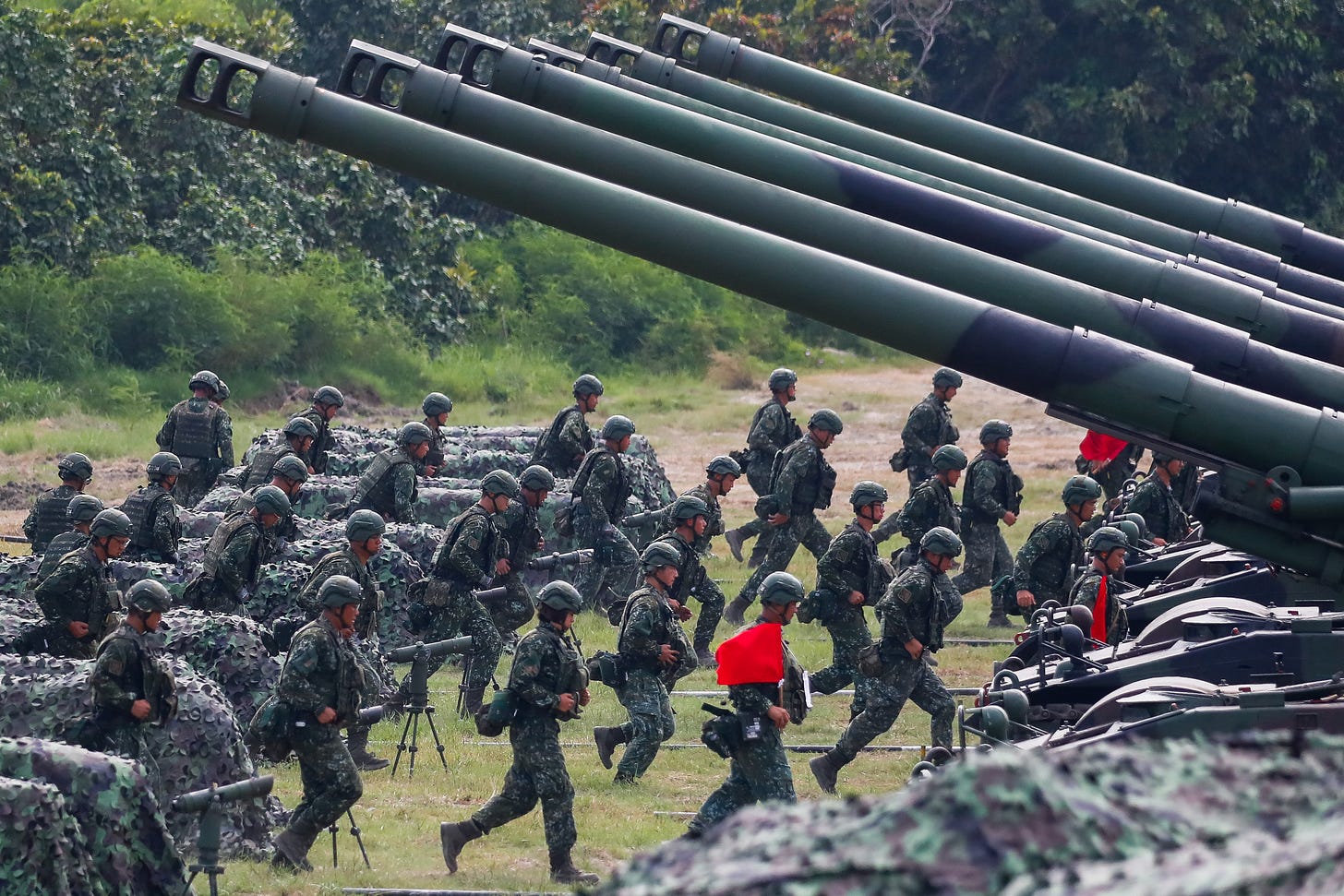Stepping Up U.S. Deterrence in Taiwan
. . . to counter China’s “salami tactics” of incremental escalation and forestall an attack.

TO DATE, THE UNITED STATES HAS DONE A CREDIBLE JOB of helping Taiwan deter a formal military attack by China—mainly by ensuring that the ultimate outcome would be uncertain and that a protracted conflict might disrupt China’s imports of food and energy. In other words, Taiwan would not be a cheap or an easy victory for China, if a victory at all.
Alongside this stick is the carrot of reassurance: The United States has repeatedly and publicly stated that it would not support a formal Taiwanese declaration of independence and it has similarly cautioned Taiwan not to take such a step, which Beijing would likely consider tantamount to a declaration of war. So the politics of the issue have been diffused, if only for the moment.
But this at least temporary success in formal deterrence is balanced out by China’s increasingly assertive “gray zone” activity: military activity short of war that is designed to intimidate Taiwan, reduce its operational space, or circumscribe its politico-military options. U.S. policy has had little impact and China’s military activity continues to grow in this sphere.
Just after the inauguration of Taiwanese President Lai Ching-te, China carried out its most ambitious blockade exercise ever, Joint Sword 2024A, in which it simulated an encirclement of Taiwan.
Other gray zone activities are less dramatic, but still signal hostility: a continued military buildout in the South China Sea and ongoing incursions by the PLA Air Force all serve to remind us that China views military pressure on Taiwan as a legitimate and appropriate policy. Taiwan states that PLA air incursions have increased more than fivefold, from 36 in January to 193 in August.
More troubling, the stage is set for escalation. As Australian Ambassador to the United States Kevin Rudd relates, “Importantly, there is nothing preventing an accelerating multidimensional gray zone strategy from folding into a broader blockade or even military invasion if gray zone measures fail to procure the desired political end state in Taiwan itself.”
We should expect ongoing incremental, escalation from China. Taiwan policy is a domestic political issue in China and everybody in the chain of command must show fidelity to this core national policy. If a midlevel official were to show restraint regarding overflights, for example, it would be perceived as disloyalty or cowardice, not wise statecraft.
The Chinese system is geared to mission creep. If reunification has been defined as a national mission and if everyone in the Chinese system must support it, they all have a need not just to loyally support the mission but to conspicuously demonstrate their support through occasional intrusions, escalations, and confrontations. Public friction is a feature, not a bug.
China benefits from a bad habit. The Chinese military will continue to take risks, to experiment, to try new ways to prod, test, and even provoke Taiwan. If it can successfully bully Taiwan at will, it will set a pattern of expectations and morale. The PLA could soon be on par with the American military, at least in the Asia-Pacific region. If Taiwan and the United States are habituated to these incremental wins by China, it will be that much harder for them to respond to the next aggressive act in the gray zone. China is lowering the bar.
SO WHAT SHOULD THE UNITED STATES DO? It can reassure Taiwan and signal China by deepening economic ties with Taiwan. The best step would be a U.S.-Taiwan Free Trade Agreement, which might not be possible given the current domestic political environment. But short of an FTA, the United States and Taiwan could move partially or fully toward open skies in air travel, improving tourism and connectivity. Similarly, the two trading partners could undertake a sectoral liberalization in electric vehicles or medical supplies, again capturing some economic benefits and sending a useful signal.
American leaders must also be mindful of negative signals, especially statements that appear to degrade the relationship or focus exclusively on its costs. Former President Donald Trump said in a recent Bloomberg interview, “Taiwan. I know the people very well, respect them greatly. They did take about 100 percent of our chip business. I think Taiwan should pay us for defense. You know, we’re no different than an insurance company. Taiwan doesn’t give us anything. Taiwan is 9,500 miles away.” Statements of this sort are likely to be interpreted in Beijing as a sign that the United States does not attach importance to Taiwan’s defense.
A real-world demonstration of U.S. power, perhaps regarding the Philippines, could be salutary. China is currently bullying the Philippines for control of the Second Thomas Shoal in the Philippines in a fashion similar to what we might see regarding Taiwan. The introduction of a U.S. Coast Guard vessel to accompany the Philippines Coast Guard on certain missions would send a message to Beijing that the United States takes its military treaties seriously. The United States need not intervened directly in the Second Thomas Shoal resupply missions; there are ancillary ways in which U.S. involvement could be helpful and send a clear signal.
Taiwan, for its part, should heed the ancient advice: If you seek peace, prepare for war. Taiwan should increase its defense budget, currently at 2.2 percent of its GDP, and build out its conscription (currently set at one year).
China is unlikely to show restraint unless a cost is attached to its actions. Time to attach a cost.



